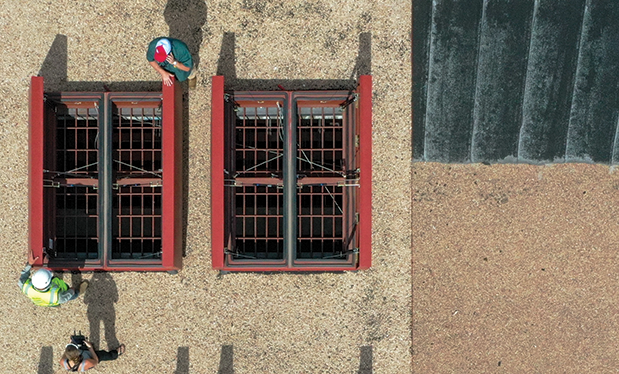Contractor exposes workers to fall hazards despite previous citations
The Occupational Safety and Health Administration cited Juan Zuniga Ramos, operator of JZ Exteriors and Repairs LLC, Fairmont City, Ill., for endangering workers after OSHA inspectors observed six workers removing asphalt shingles from heights up to 12 feet without fall protection in Greenville, Ill., April 18. The contractor is not an NRCA member.
Inspectors noted Ramos failed to use ladders properly, exposed workers to electrical hazards by not deenergizing circuits and did not have a fire extinguisher available. JZ Exteriors and Repairs also lacked an accident-prevention program and did not have a competent person to inspect worksites for hazards.
Ramos formerly was cited by OSHA for fall-protection violations at a Highland, Ill., job site in 2022 and a St. Charles, Mo., job site in 2019. Currently, JZ Exteriors and Repairs owes $31,163 in unpaid OSHA penalties.
For this case, OSHA cited JZ Exteriors and Repairs for five repeat and four serious violations and one other-than-serious safety violation and proposed $66,711 in penalties.
Iowa child labor law rollbacks pose challenge for Department of Labor

|
The Biden administration has limited tools to fight child labor violations in Iowa where a Republican state legislature enacted a statute that would allow minors to work in conditions that are illegal under federal law.
Department of Labor officials have said the bill violates federal protections that trump state rules; however, DOL has not outlined a plan to boost enforcement in Iowa or other states loosening child labor restrictions.
The new Iowa law took effect July 1 and extends the hours minors can work, limits business liability for an underage worker’s injuries, and allows teenage apprentices to work in jobs that have previously been deemed too hazardous, including roofing, warehouse and factory work.
Labor attorneys say DOL can educate the public about the law and use its limited resources to focus its enforcement in states, but the department cannot compel state labor officials in Iowa, or any state with child labor laws looser than federal law, to enforce federal rules on their own. DOL said in a statement it “monitors state laws” and will “enforce accordingly” but did not provide concrete assurance about altering oversight plans as a result of the new Iowa statute.
The Biden administration announced an interagency task force in February to combat child labor exploitation but has not provided details about the task force’s work since March. State lawmakers and unions are moving to educate employers and parents about Fair Labor Standards Act requirements and clarify that following the new rules in Iowa could conflict with federal law.
Texas law eliminates water break mandates for some construction workers

|
On Sept. 1, a new law approved by Gov. Greg Abbott (R-Texas) took effect, eliminating mandated water breaks for some state construction workers. There currently is not a federal standard to protect workers from dangerous heat conditions, but the Occupational Safety and Health Administration is developing one.
The Texas Regulatory Consistency Act rolls back locally enacted protections that go further than state law, including ordinances in Austin and Dallas, which required 10-minute breaks every four hours for construction workers to hydrate and get a break from the sun. Supporters of the law say it eliminates varied ordinances across Texas.
Forty-two workers died in Texas from heat exposure between 2011 and 2021, the highest amount in the U.S., and Texas recorded its second-hottest summer in 2022. OSHA and the National Institute for Occupational Safety recommend workers consume 1 cup of water every 15 to 20 minutes, which is more rigorous than local Texas laws.
Geoffrey Tahuahua, president of the Associated Builders and Contractors of Texas, told The Texas Tribune rigid rules can encourage contractors to do the minimum to protect workers rather than empower them to evaluate job sites individually.
David Michaels, head of OSHA from 2009 to 2017 and current professor at George Washington University School for Public Health, Washington, D.C., told The Texas Tribune though employers hold the ultimate responsibility of keeping workers safe, many are doing an inadequate job.
Joe Garza, environmental health and safety leader in Austin for DPR Construction, Redwood City, Calif., said whenever a safety ordinance is revoked, contractors still have the responsibility to focus on the safety of workers on the job.
“We believe we cannot properly do business and keep workers safe without a strategy to ensure workers are protected from heat-related illness,” Garza said. “We do think, unfortunately, this new law underestimates this need, and we hope people procuring construction services ask how their vendors will account for heat and safety.”



